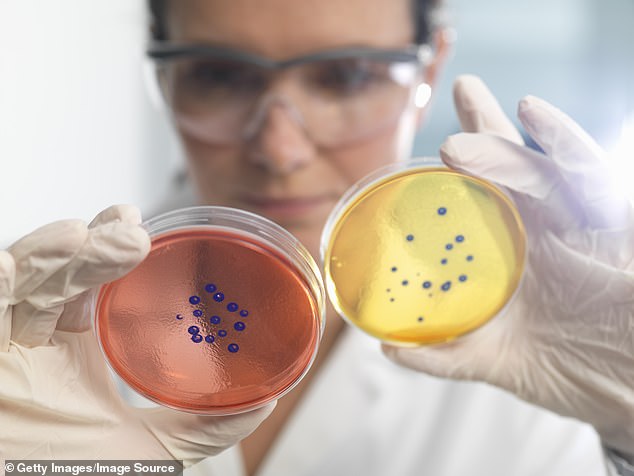Hospital superbugs can be destroyed by ‘engineered’ bacteria created by scientists, research suggests.
Experts used the ‘living medicine’ to fight antibiotic-resistant superbugs which infect hospital patients through catheters and breathing tubes.
The bacteria destroyed Staphylococcus aureus infections on catheters in mice, but experts plan to start trials in people with lung infections from breathing tubes in 2023.

Hospital superbugs can be destroyed by ‘engineered’ bacteria created by scientists, research suggests. Pictured: A scientists examines a pair of Petri dishes (stock image)
It is hoped the bacteria may work for other hospital superbugs like MRSA. Scientists say the bugs clump together to form ‘biofilms’ which cannot be penetrated by antibiotics.
But the engineered bacteria cut through the biofilm and destroy bugs using special enzymes.
The discovery is being hailed as a breakthrough in the battle against the growing problem of antibiotic resistance.
If antibiotics do not work in the future, patients could die from infections following operations such as hip replacements and caesarean sections.
Research leader Professor Luis Serrano, of the Centre for Genomic Regulation in Barcelona, said: ‘Bacteria are ideal vehicles for ‘living medicine’ because they can carry any given therapeutic protein to treat the source of a disease.’
Professor Colin Garner, of Antibiotic Research UK, who was not involved in the study, said: ‘We need researchers thinking outside of the box like this.
‘The results are very promising and welcome as biofilm infections can cause sepsis and death, particularly in intensive care units. However, there is a long and expensive path ahead to see if the method actually works in patients with resistant biofilm infections.’

Research leader Professor Luis Serrano (pictured), of the Centre for Genomic Regulation in Barcelona, said: ‘Bacteria are ideal vehicles for ‘living medicine’ because they can carry any given therapeutic protein to treat the source of a disease.’
The study took bacteria called Mycoplasma pneumoniae, which cause mild pneumonia in people with lowered immune systems, and genetically engineered it to be harmless in people.
Experts then further engineered it to produce two enzymes which kill Staphyloccus aureus. People could take the new treatment as an aerosol spray in the nose or throat.
The researchers, who spent 15 years working on the technology, say that injecting the therapy under the skin of mice removed infections on catheters in 82 per cent of the animals.
The bacteria lasted four to seven days before being cleared by the immune system.
Source link : https://www.dailymail.co.uk/news/article-10067017/Hospital-superbugs-destroyed-engineered-bacteria-research-suggests.html











